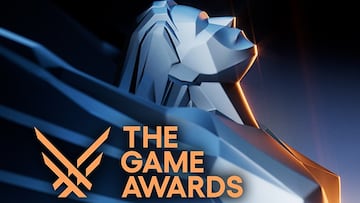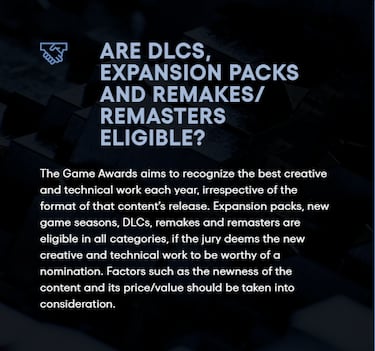Does a DLC have the right to be a GOTY? The Game Awards should go the other way
Is this a good thing, or is it time to redefine what constitutes a complete game?

The awards season for this year’s best video games has sparked a new debate. This time it is not about whether a game was included or not, nor whether these awards have any real value. We are faced with a change in the rules that will have a major impact on the awards, with a DLC, Elden Ring: Shadow of the Erdtree, being shortlisted for the most anticipated title at The Game Awards. But is it fair for a DLC to be nominated for a GOTY? Let’s take it one step at a time.
Why is Shadow of the Erdtree entering the competition?
There’s no denying the brilliance and impact that Elden Ring has had over the past few years. Whether you’re a gamer looking for a spiritual challenge or an industry insider, the influence of Hidetaka Miyazaki and From Software’s latest installment is something that cannot be ignored. So much so, in fact, that it was awarded the top prize in 2022 and was the big winner at this year’s The Game Awards.
In the middle of this year, we saw the arrival of a DLC that went beyond simple downloadable content to become an expansion in its own right. Shadow of the Erdtree allowed players to delve deeper into the game’s story with an adventure that expanded the story, weapons, bosses and all the mystique of the base game. Hell, even these editorial office acclaimed the expansion.
Why is it that some titles can compete and similar titles cannot?
As I write this, doesn’t it sound like something similar to what happened last year? Cyberpunk 2077: Phantom Liberty arrived in late 2023 to expand the game and be the icing on the cake of CD Projekt RED’s redemption journey after a very bumpy launch a few years earlier. The expansion extended the original story and introduced new gameplay mechanics, new areas, abilities, and hours of gameplay. With five nominations last year, it managed to take home the title of Best Ongoing Game. Mind you, it wasn’t even nominated for a GOTY.
It is not Geoff Keighley’s intention that Elden Ring: Shadow of the Erdtree be nominated just for the sake of it. There was a first round of nominations by the trade press, and this time early access games like Hades II and expansions like Shadow of the Erdtree could be nominated in all categories. Is this the fault of those who vote or those who set the rules?
In the past, other DLC and expansions have been nominated and even won outside of their category. The Witcher 3: Wild Hunt - Blood and Wine won Best RPG in 2016, but didn’t go further.

Explaining with analogies
When we talk about awards in the games industry, our main reference point is the Academy Awards. On the one hand, the legitimization of our industry seeks to imitate established models, but on the other hand, as an industry, we should force ourselves to find our own way. Analogies help us to illustrate things, even if they sound exaggerated, and maybe this case deserves it.
Changing the rules and accepting early access or expansions would be like the Academy accepting a movie that is still in the editing room, with no effects and an ending that may not be the final one, or like Star Wars: A New Hope being nominated for Best Picture again when it was re-released in 1997 (let’s not forget that the original version received such a nomination in 1977). When you look at it that way, you realize that we shouldn’t get too far ahead of ourselves with a game in Early Access, no matter how good it is now or how many extras it might get. It’s true that no one nominated Baldur’s Gate III in 2020, but could it have won in two ceremonies, as Early Access and as a full game?
A possible suggestion
If there is one thing we must accept, it is that the industry will continue to evolve over the years. Pointing fingers and saying “this is wrong” or trying to deflect by blaming a group or individuals on social media will not get us anywhere. The proposal is to return the rules to the way they were, but to be flexible enough to create new categories if necessary. A category like “Best Expansion” could distinguish between games as a service that are constantly updated and those titles that are strengthened by a strong expansion. A category like “Best Promising Game” could open the doors to titles that are not yet finished, but show the spark that will make them real contenders in a few months or years. This, along with the already existing “Best Debut Indie Game” could give us a glimpse into the future of the industry.
Related stories
Unlike the Academy Awards of the movie world, the video game industry has no centralized body that can provide an absolute definition of the work produced and distributed in this interactive medium. The categories and genres we take for granted are simply terms popularized by the press and fans, which complicates the efforts of an event like the Game Awards to become the most important award. You only have to look at similar ceremonies such as the DICE Awards and the Golden Joysticks to see the many directions this type of award can go.
In any case, we can’t change the list of nominees for 2024, but we can think about how we can use our voices in the future to bring more order to The Game Awards.


Complete your personal details to comment